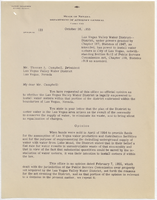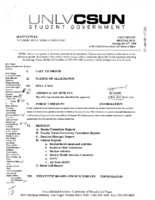Search the Special Collections and Archives Portal
Search Results
Evelyn Stuckey Papers
Identifier
Abstract
The Evelyn Stuckey Papers date from 1940 to 1972 and document Stuckey's experience as a physical education teacher at Las Vegas High School (LVHS) in Las Vegas, Nevada and founder of the LVHS Rhythmettes dance group. The collection contains personal and educational materials from Stuckey’s college years, personal correspondence, and photographs. It also contains materials documenting the Rhythmettes' activities including travel plans, posters and fliers, news clippings, and group rosters.
Archival Collection
Bella Tyktin Stern Papers
Identifier
Abstract
The Bella Tyktin Stern papers (approximately 1930-1997) document the life and travels of Las Vegas, Nevada resident Bella Tyktin Stern. The collection focuses on the trips she took within the state of Nevada as a guide for Nevada Discovery Tours, featuring travel itineraries and travel brochures. The collection also includes biographical materials, such as personal correspondence, legal documents, postcards sent to Stern from her Aunt Rose, and an untranslated copy of Stern's unpublished autobiography written in German,
Archival Collection
State of Arizona vs. State of California Proceedings Concerning the Colorado River Usage Dispute
Identifier
Abstract
The State of Arizona vs. State of California Proceedings Concerning the Colorado River Usage Dispute collection (1957-1961) contains supplemental documents from the
Archival Collection
UNLV Libraries Collection of Scientific Games Holding Corporation Financial Reports and Press Materials
Identifier
Abstract
The UNLV Libraries Collection of Scientific Games Holding Corporation Financial Reports and Press Materials contains financial reports, equity research reports, Securities Exchange Commission Form 10-K, Securities Exchange Commission Form 10-Q, prospectus, press kits, and press releases from Scientific Games Holding Corporation, an instant lottery ticket manufacturer based in Alpharetta, Georgia. The records date from 1993 to 2006.
Archival Collection
Katherine A. Spilde Papers on Native American Gaming
Identifier
Abstract
The Katherine A. Spilde Papers on Native American Gaming include materials collected by anthropologist Katherine Spilde about Native American gaming and the greater gaming industry. The materials date from 1789 to 2015, with the bulk of materials dating from 1995 to 2010. Materials dating from the eighteenth and nineteenth centuries are reproductions of key court opinions and treaties concerning Native American rights and sovereignty. The majority of the materials document Native American gaming following the passage of the 1988 Indian Gaming Regulatory Act (IGRA). The papers detail Native American gaming enterprises both on and off reservations, the socioeconomic impact of gaming, and the legislative history of Native American gaming in the United States. The papers include research and subject files created by Dr. Spilde during her employment with the National Gambling Impact Study Commission (NGISC), the National Indian Gaming Association (NIGA), and the Harvard Project on American Indian Economic Development (HPAIED). The collection includes socioeconomic reports; testimonies; correspondence; memos; press releases; photographs; audiovisual materials; promotional materials from casinos and tourist attractions; brochures; fact sheets; summaries; booklets; pamphlets; advertisements; tourism materials; journal articles; legal briefs; legislative documents; court opinions; Dr. Spilde’s notes; presentations; packets, agenda, schedules, and itineraries from conferences; periodicals; Native American and community newspapers; and newspaper articles. The collection includes materials about over one hundred federally recognized Native American nations. Also included are materials that document the socioeconomic impact of gaming, the international gaming industry, criminal activities related to gaming, advertising about gaming and casinos, lotteries, internet gaming, compulsive gambling, and bankruptcy as a result of gambling.
Archival Collection

Kimberly and William King oral history interview: transcript
Date
Archival Collection
Description
Oral history interview with Kimberly and William King conducted by Claytee D. White on November 27, 2017 for the Remembering 1 October Oral History Project. In this interview, Kimberly and William King discuss the October 2017 mass shooting in Las Vegas, Nevada and their experiences from that day. They talk about attending the Route 91 Harvest festival and their struggle to find safety and obtain medical medical attention for William after he was shot. Kimberly describes her feelings regarding the city prior to the shooting and how her perspective on Las Vegas has changed. The couple finish the interview with a discussion of life after the shooting, especially in regards to love and community.
Text

Olivia Díaz oral history interview: transcripts
Date
Archival Collection
Description
Oral history interviews with Olivia Díaz conducted by Nathalie Martinez and Barbara Tabach on August 31 and September 14, 2020 for the Latinx Voices of Southern Nevada Oral History Project. In the first interview, Díaz gives her family and personal history, growing up in Las Vegas but often visiting her family in Durango, Mexico for extended stays. She recalls her matriarchal upbringing, particularly while living in Mexico, and what life was like growing up and going to school in East Las Vegas and at the University of Nevada Las Vegas (UNLV). Subjects discussed include: Mexico; Latina identity. In the second interview, Díaz talks about her English language education career for the Clark County School District (CCSD) and the events that led her to run for Nevada Assembly and Las Vegas City Council. She is presently Nevada's Assemblywoman for District 11 and Las Vegas' Councilwoman for Ward 3. Olivia concludes her interview with insights into her political and educational goals for the community and the initiatives she has focused on in light of the COVID-19 pandemic.
Text

Brad Jerbic and Tom Perrigo oral history interview: transcript
Date
Archival Collection
Description
Oral history interview with Brad Jerbic and Tom Perrigo conducted by Claytee D. White on June 26, 2019 for the Remembering 1 October Oral History Project. Brad Jerbic and Tom Perrigo share their experiences working with landscape architect Jay Pleggenkuhle to create the Healing Garden of Las Vegas after the October 1 shooting. They discuss how the community was in need of a place to mourn and heal after the tragedy, and how imperative it was for the space to be constructed quickly. Brad and Thomas share how the garden was constructed in four days and the various members of the community who helped to make it possible.
Text

Letter including Nevada Attorney General Opinion No. 123 from Harvey Dickerson to Thomas A. Campbell (Las Vegas), October 26, 1955
Date
Archival Collection
Description
Notwithstanding Section 6112 of the Public Service Commission Act, the Las Vegas Valley Water District was allowed to meter water to customers; Opinion No. 123.
Text

Meeting minutes for Consolidated Student Senate, University of Nevada, Las Vegas, October 13, 2008
Date
Archival Collection
Description
Text
